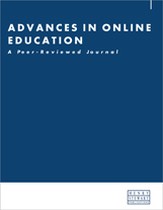The transition from traditional to online education for the adult learner
Abstract
Most educational institutions have been forced to transition to online education, prompting the adaptation of instructional approaches to ensure the diverse student population is accommodated. Digital learning platforms have created educational barriers for many adult students as the shift towards online education has accelerated due to the global COVID-19 pandemic. Decades of traditional classroom experiences have enabled learned behaviour and the shift to online may no longer align with the students’ preferences, decreasing motivation and resulting in suboptimal outcomes. Exploration of the transition from traditional to online education has found technological barriers and the development of inclusive learning environments as transitional complexities for the adult learner. Examination of advantages and disadvantages of age-appropriate inclusive learning environments enables adaptation to equivalent learning opportunities. The transition to online education presents challenges and opportunities; however, through continuous evaluation and refinement, adaptation of digital learning can enhance the adult learner experience.
The full article is available to subscribers to this journal (subscription is free).
Author's Biography
Lauren Di Giovanni , DBA has a diverse academic background, holds degrees in science, paramedic educational management, BS/MS in civil, structural and environmental engineering and an MBA with a concentration in healthcare management. Transitioning from a paramedic to a healthcare leader, she excels in hospital administration, healthcare management and organisational development. Her research focuses on the intersection of these areas, bringing a unique perspective to drive operational efficiency in healthcare. Currently serving as a Paramedic and fill-in Supervisor, Lauren leverages her paramedic experience to bridge theory and practice in healthcare.
Julia Cronin-Gilmore , PhD is a Professor of Business and Director of the Doctorate of Business Administration degree at Bellevue University. Along with her teaching responsibilities, Julia serves as Chairman of the Board for Cobalt Credit Union, a US$1bn+ financial institution in Nebraska. She is on the editorial review board for the Journal of Brand Strategy, based in London, UK, and serves on the Harvard Business Review Advisory Council. In addition, Julia is the Journal for Excellence in Business Education Editor Emeritus, reviewer for Prentice Hall publisher and international and national business conferences.
Citation
Di Giovanni, Lauren and Cronin-Gilmore, Julia (2024, June 1). The transition from traditional to online education for the adult learner. In the Advances in Online Education: A Peer-Reviewed Journal, Volume 2, Issue 4. https://doi.org/10.69554/JSCD9705.Publications LLP
